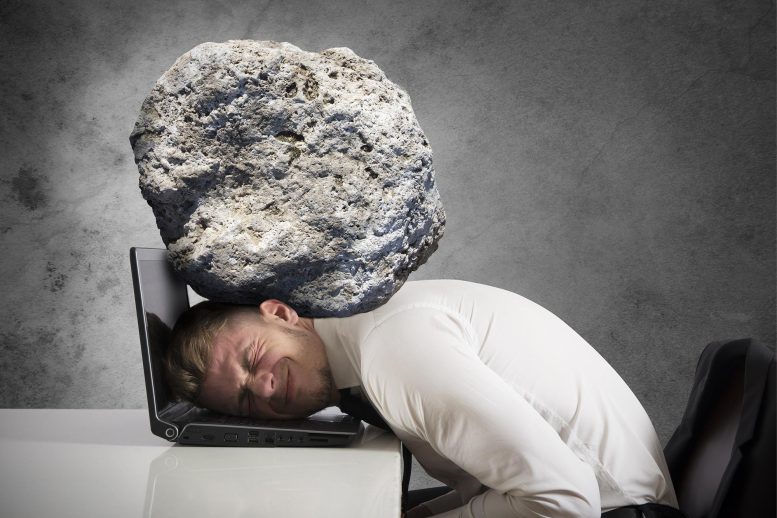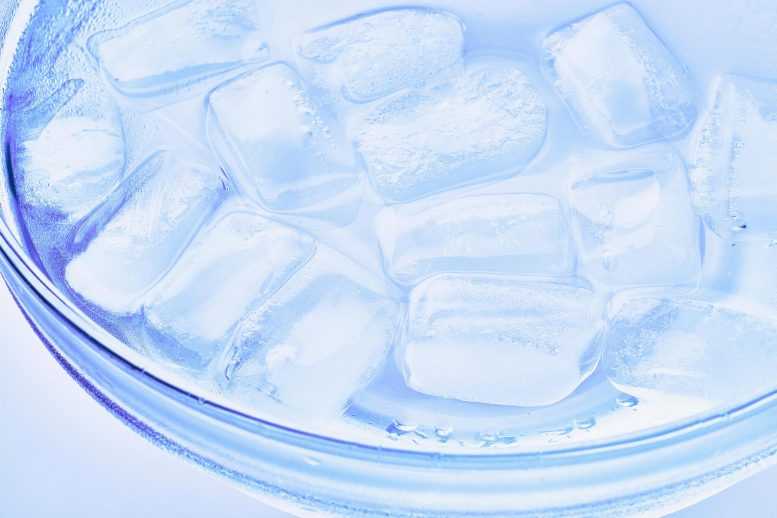
High levels of stress and pressure can leave you feeling awful. Fortunately, science offers a few unusual ways to provide some relief.
Many people experience extremely high levels of stress and anxiety. What do you do when work pressures, family pressures, and financial pressures come together to leave you overwhelmed and panicked? If you’re one of the lucky ones, you’re able to get a good night’s sleep and lower your stress somewhat. Even so, if you’re prone to stress, sleep, exercise, and time off can only do so much for you. If you still find yourself stressed, there are a few science-based stress-lowering hacks that you could try for quick relief.

Immersing your face in a bowl of ice-cold water could activate the diving reflex, which has been shown to lower anxiety.
Exploit the mammalian diving reflex
If you’re extremely stressed and can actually feel your heart beating and your blood pounding, activating the diving reflex can help: it can slow the heart down, and make the body move more blood toward your vital organs. These responses have been shown to have the side effect of strongly lowering anxiety.[1]
The ideal way to activate the diving reflex would be to fill a large bowl with ice-cold water and immerse your face in it for about 30 seconds, or as long as you can hold your breath. If you can’t find a large bowl like that, you could also try pressing your face into a large ice pack.
If you suffer low blood pressure or other heart conditions, however, it’s important to clear this with your doctor before trying it out.

Biting into a hot pepper can jolt your mind away from obsessive anxiety.
Subject yourself to strong sensations
When you’re stressed and anxious, the mind tends to narrow its focus to include only the things that bother you the most. You might be able to distract yourself with movies, video games, or alcohol for a short time, but these choices can waste time or affect your health. It could be a more effective approach to finding a strong source of sensory stimulation that is able to jolt your mind away from obsessive anxiety.[2] Biting into a hot pepper or sucking on a lemon are among the kinds of strong sensory stimulation you could try.

Exposure to fractals can help soothe your mind.
Look for fractals
It’s well-known that being outdoors in nature helps beat stress.[3] However, research is also beginning to show that exposure to any imagery that mimics some of the intricate pattern types seen in nature is able to create similar relaxing effects. Images of fractals — patterns that repeat on a scale that gets smaller and smaller — can help.[4] These are seen in nature in things like snowflakes and nautilus shells. Many computer images, and even Jackson Pollock’s famous paintings, have been found to contain fractals.[5] Nature tends to produce these shapes that are complex, yet accessible, and humans tend to relax in their presence.

Distancing yourself from your situation can help relieve your anxiety.
Distance yourself from yourself
If you find yourself trapped in anxiety and negativity, it can help to find a way to distance yourself from your situation. Researchers have discovered that it can help you achieve this to speak to yourself about yourself in the third person. Talking about yourself as he, she, or they, rather than using I, could help you mentally distance yourself from whatever makes you anxious.[6]

Yawning has been found to lower stress levels.
Try yawning
The brain warms up when you feel stress and anxiety, and finding a way to cool it down could help lower your stress. One way to cool your brain is to yawn — it has a cooling effect on the brain in humans.[7] Yawning even naturally occurs with some kinds of stress. It doesn’t occur naturally with every kind of stress, however. If you’re stressed out and need some kind of release, trying to yawn could help. Since you can’t yawn on demand, it could help to go on YouTube and watch videos of people yawning: yawning tends to be contagious. You could find that it lowers your stress.
Lowering stress can greatly improve your quality of life, and improve the decisions you make. Not every method works for everyone, but you could try these unconventional, but science-backed ideas to see if they make a difference for you.
References:
- “The Implications of the Diving Response in Reducing Panic Symptoms” by Peter Kyriakoulis, Michael Kyrios, Antonio Egidio Nardi, Rafael C. Freire and Mark Schier, 29 November 2021, Frontiers in Psychiatry.
DOI: 10.3389/fpsyt.2021.784884 - “Dealing with feeling: A meta-analysis of the effectiveness of strategies derived from the process model of emotion regulation” by Thomas L. Webb, Eleanor Miles and Paschal Sheeran, 2012, Psychological Bulletin.
DOI: 10.1037/a0027600 - “The Role of Nature in Coping with Psycho-Physiological Stress: A Literature Review on Restorativeness” by Rita Berto, 21 October 2014, Behavioral Sciences.
DOI: 10.3390/bs4040394 - “Reduction of Physiological Stress Using Fractal Art and Architecture” by R. P. Taylor, June 2006, Leonardo.
DOI: 10.1162/leon.2006.39.3.245 - “Perceptual and physiological responses to Jackson Pollock’s fractals” by Richard P. Taylor, Branka Spehar, Paul Van Donkelaar and Caroline M. Hagerhall, 22 June 2011, Frontiers in Human Neuroscience.
DOI: 10.3389/fnhum.2011.00060 - “Does Distanced Self-Talk Facilitate Emotion Regulation Across a Range of Emotionally Intense Experiences?” by Ariana Orvell, Brian D. Vickers, Brittany Drake, Philippe Verduyn, Ozlem Ayduk, Jason Moser, John Jonides and Ethan Kross, 5 October 2020, Clinical Psychological Science.
DOI: 10.1177/2167702620951539 - “The thermoregulatory theory of yawning: what we know from over 5 years of research” by Andrew C. Gallup and Omar T. Eldakar, 2 January 2013, Frontiers in Neuroscience.
DOI: 10.3389/fnins.2012.00188








Be the first to comment on "5 Unusual Ways to Beat Stress, Backed by Science"